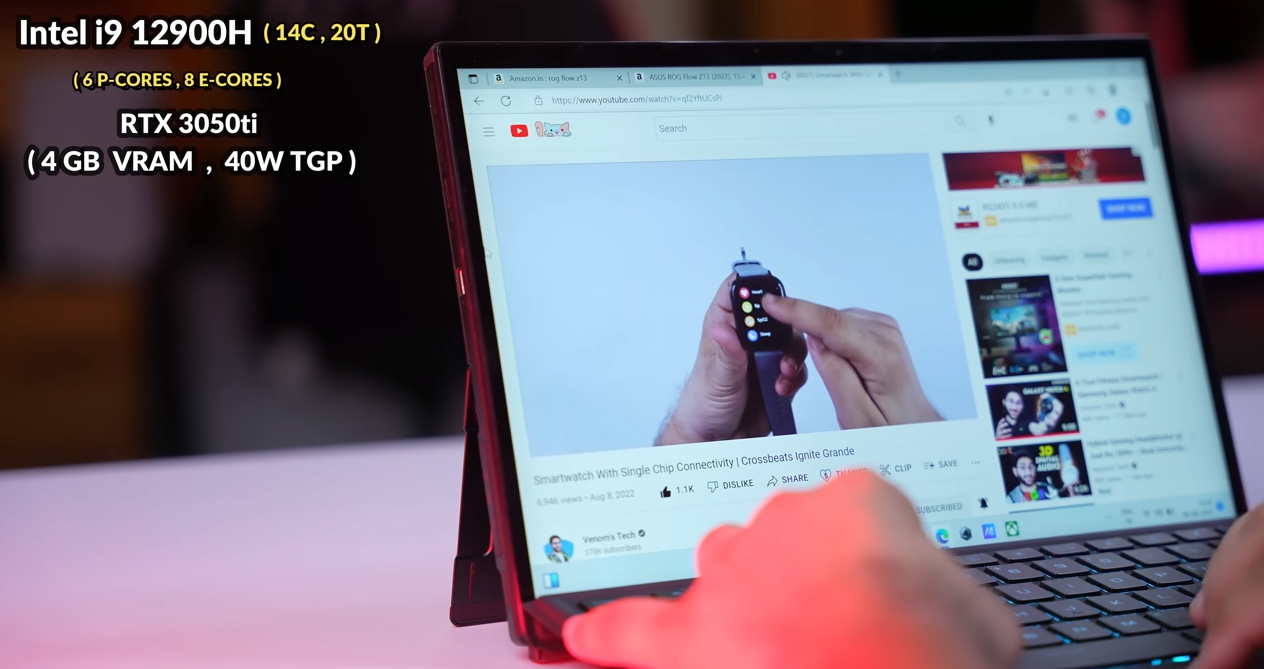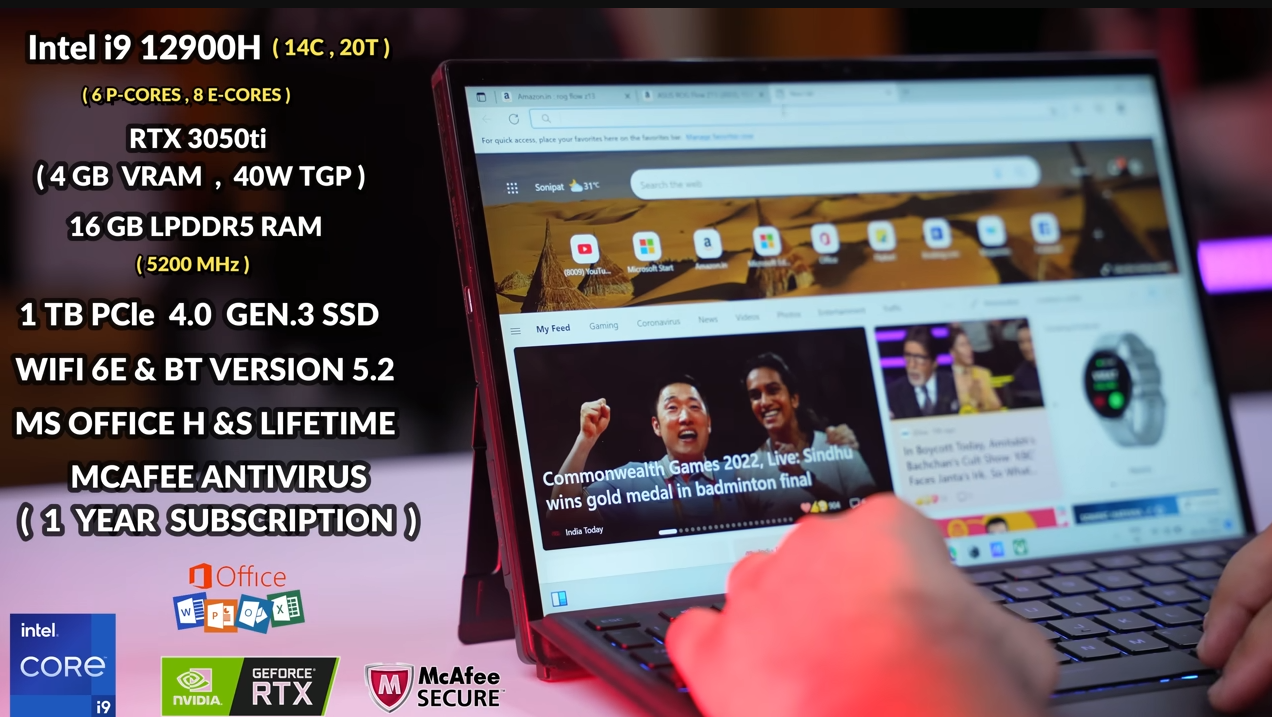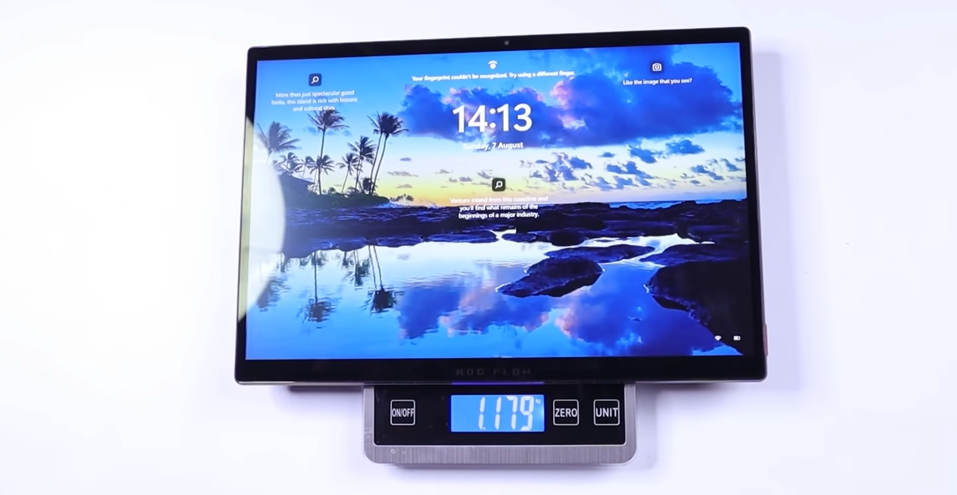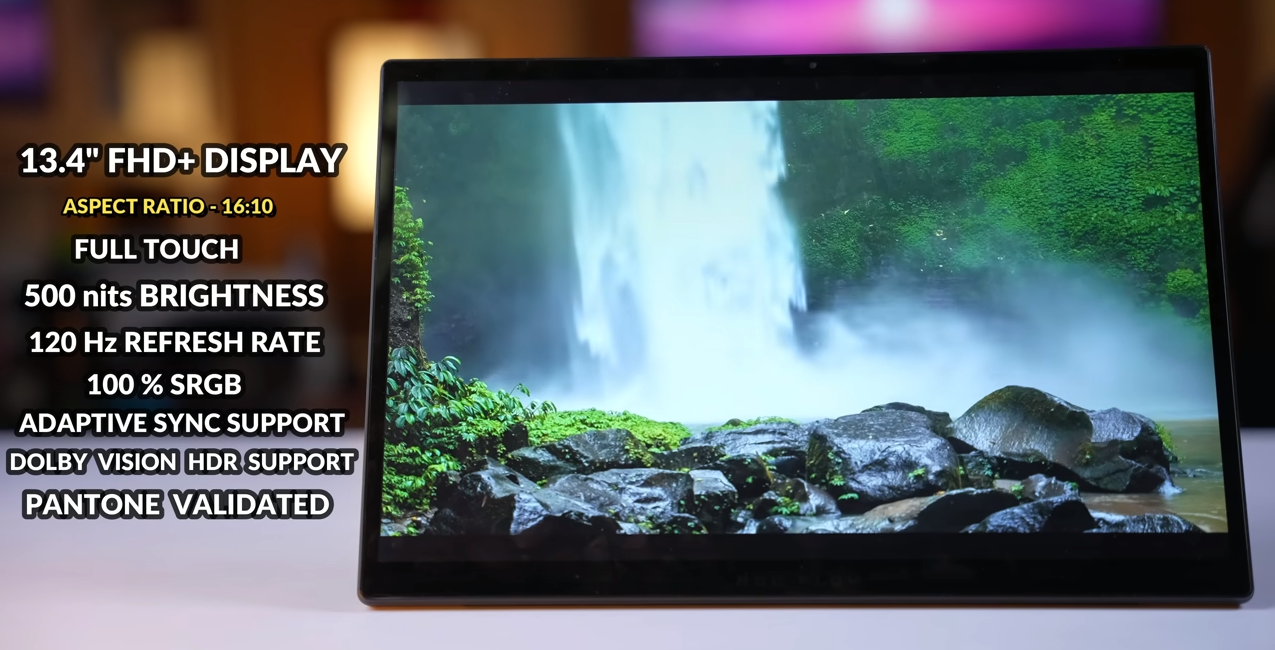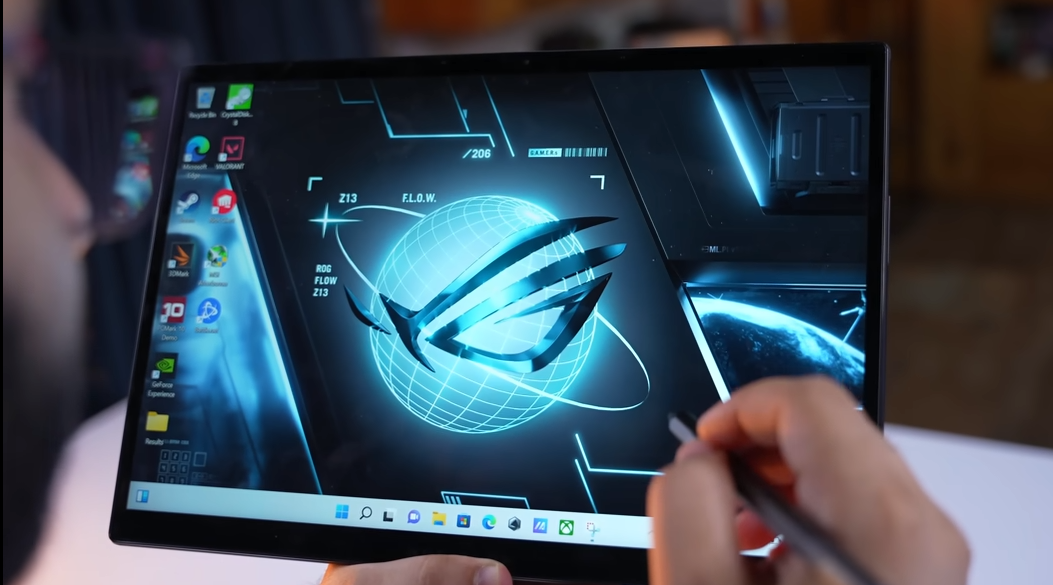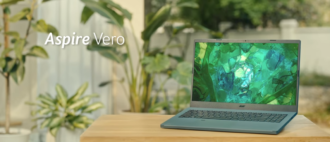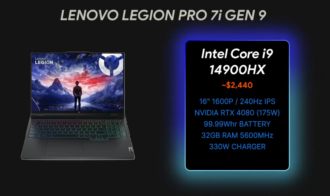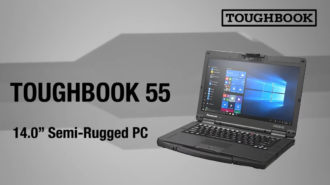Asus ROG Flow Z13
- 1 Asus ROG Flow Z13 Specifications
- 1.1 Introduction
- 1.2 Features
- 1.3 Overall Package
- 1.4 Speed of typing
- 1.5 Speakers
- 2 Verdict:
- 2.1 FAQs:
- 2.1.1 Can the Asus ROG Flow Z13 be used for gaming on the go?
- 2.1.2 Does the Z13 support stylus input?
- 2.1.3 What are the options for display resolution and refresh rate?
- 2.1.4 Is the detachable keyboard included in the package?
- 2.1.5 What is the battery life like on the Z13?
- 2.1.6 Can the Z13 be upgraded with an external graphics card (eGPU)?
- 2.1.7 How does the Z13’s keyboard perform for typing?
In Short:
- Versatile Design: The Asus ROG Flow Z13 offers a unique 2-in-1 design, combining a tablet’s portability with a gaming laptop’s functionality, making it suitable for on-the-go gaming or productivity tasks.
- Impressive Display and Performance: With features like a 1080p 120Hz display supporting a stylus and hardware, including an Intel Core i9 processor and Nvidia GeForce RTX 3050 Ti graphics card, the Z13 delivers smooth gameplay and vibrant visuals.
- Limitations and Considerations: While the Z13 excels in certain areas, its battery life may not meet expectations for extended gaming sessions or productivity on the go, and its price point may not justify its performance for some users.
Gaming computers don’t tend to be shy about adding new features that could be innovative. These include display technologies that are always getting better, second screens, and new options for external graphics card units (eGPUs). ROG, Asus’s game sub-brand, has tried all these, but here we’ll focus on the last one. It’s an exciting idea that lets you take your thin device with you and allows you to pay more to turn it into a full-fledged gaming laptop.
Asus ROG Flow Z13 Specifications
| Support stylus | YES |
| Response Time | 30ms |
| Processor | 12th Gen Intel Core i9-12900H Processor |
| Display | 13.4-inch |
| Support Dolby Vision HDR | YES |
| Memory | 8GB*2 LPDDR5 on board |
| OS | Windows 11 Home |
| Battery | 56 Wh |
| Connectivity | Wireless 6E |
| Storage | 1TB PCIe 4.0 NVMe M.2 SSD (2230) |
PROS:
- Excellent refresh rates for a tablet
- Colorful, unique style
- Slim, foldable metal frame
- Display supporting a pen and a high-resolution
CONS:
- Don’t count on a long battery life
Introduction
The ROG XG Mobile eGPU was first seen in the Asus ROG Flow X13, a super-thin clamshell laptop that can boost game power with the help of the eGPU unit. ROG’s new kit goes even further with this idea of improving performance. For example, the Flow Z13 is a rare 2-in-1 game tablet that can also be used as a laptop. Asus has already tried to make a suitable device like the Microsoft Surface Pro.
The VivoBook 13 Slate OLED device looks a lot like this one. But in the end, it wasn’t powerful enough and cost too much to compete with Microsoft’s 2-in-1 approach. The Z13 doesn’t make the same mistakes. The fact that it is a tablet makes it more useful as a gaming gadget because it can be taken anywhere.
Features
The tablet weighs 2.6 lbs (1.2 kg), which isn’t as light as many thin laptops. It is excellent, given the specs inside. It’s also a device that encourages you to remove the detachable keyboard, which is included in the price (unlike Surface Pro machines). This lets you easily place it while you play with a controller or a separate gaming keybodiffer, unlike many other 2-in-1s that don’t have game capabilities and don’t make sense as stand-alone tablets. It feels like a portable game PC that takes the best parts of a powerful, heavy laptop and Valve’s Steam Deck.
The Nvidia GeForce RTX 3050 Ti graphics card is to blame for the ROG Flow Z13 not living an exciting design. It’s hard to ask for more power from a GPU in a device that is so thin and relatively light, but it still limits the Z13’s potential and general appeal. But even though the RTX 3050 Ti and the Intel Core i9-12900H chips don’t have enormous power, they are great if you like games that focus more on frame than graphic detail.
With ‘Low’ settings, games like Borderlands 3 and Ghost Recon:
- Breakpoint will run at 50 to 80 frames per second on this machine’s 1080p 120-Hz display.
- The Flow Z13 also has less powerful graphics and processors, and there is a choice for a higher-resolution UHD+ display with a slower refresh rate of 60 Hz.
- The results aren’t great, but it’s all that bad for such an SM, all devices, and you can switch to 720p for a few more frames.
Overall Package
Whether you use this tablet alone or with the fantastic display, it improves my games. You might think a display with only a 1080p resolution and a high refresh rate would color on color accuracy and vibrancy. Still, this panel always gives colors colors and realistic tones. You’d have to try hard not to like this screen, whether you’re a gamer or not. The keyboard covers are essential to this set but are not all good.
The attachable section is much more flexible than similar 2-in-1 machines like the Surface Pro. But after using it for a while, it’s noticeable when typing, and if it is, a key press with a lot of travel and a good amount of feedback helps. It works fine, but users who want to get serious might want to add a mouse and keyboard from outside the system.
Speed of typing
The typing experience and the clicky but small keyboard are both suitable for productivity work, which this powerful device is more than capable of doing. On the Z13’s 16:10 screen, you can quickly write an article or two and surf the web. We found that the battery life was usually less than five hours, which made it hard to work on the go. It doesn’t play games either unless it is trendy. In general, the device will not work well and will even last an hour.
So, we’re in a tight spot because of all of this. The Asus ROG Flow Z13 has an exciting design for gamers, but the price and technology aren’t there yet for most people to buy it. You might be able to convince yourself that this is worth the money, like the idea of a light machine with low- to mid-tier gaming performance and the chance to beef it up with an eGPU for even more cash.
Speakers
At the same time, Sonos is putting out two new speakers. The Era 300 is made for the spas, so Audiocan sends multiple ways one way. The Era 100 is better than the Sonos One because it plays music in stereo and has better bass. Both have Bluetooth and USB-C line-ins, so you can quickly play music from other devices or plug in a turntable.
Verdict:
The Asus ROG Flow Z13 offers a compelling blend of portability and gaming performance with its 2-in-1 design and capable hardware. However, its limited battery life and relatively high price may deter some potential buyers, especially those seeking more bang for their gaming power.
FAQs:
Can the Asus ROG Flow Z13 be used for gaming on the go?
Yes, the Z13’s compact design and powerful hardware make it suitable for gaming on the move.
Does the Z13 support stylus input?
Yes, the Z13 supports stylus input, enhancing its versatility for creative tasks or note-taking.
What are the options for display resolution and refresh rate?
The Z13 offers a 1080p 120Hz display and a higher-resolution UHD+ option with a 60Hz refresh rate.
Is the detachable keyboard included in the package?
Yes, unlike some other 2-in-1 devices, the Z13 includes a detachable keyboard.
What is the battery life like on the Z13?
The Z13’s battery life is typically less than five hours, which may not be sufficient for extended usage away from a power source.
Can the Z13 be upgraded with an external graphics card (eGPU)?
Yes, the Z13 supports the use of the ROG XG Mobile eGPU, providing an option to enhance its gaming performance further.
How does the Z13’s keyboard perform for typing?
The Z13’s keyboard offers a decent typing experience with clicky but small keys, suitable for productivity tasks, though some users may prefer an external keyboard for more serious use.

